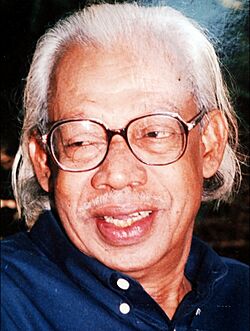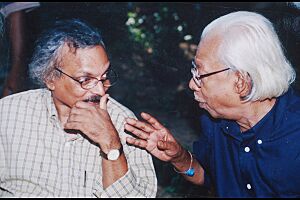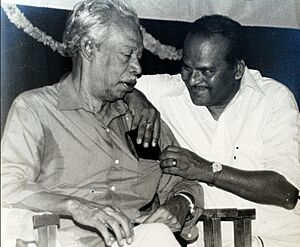Kakkanadan facts for kids
Quick facts for kids
Kakkanadan
|
|
|---|---|

Kakkanadan
|
|
| Born | 23 April 1935 Thiruvalla, Travancore (now in Kerala, India) |
| Died | 19 October 2011 (aged 76) Kollam, Kerala, India |
| Occupation | Writer |
| Nationality | Indian |
| Genre | Novel, short story |
| Literary movement | Modernism |
| Notable awards |
|
George Varghese Kakkanadan (born April 23, 1935 – died October 19, 2011) was a famous Indian writer. People usually knew him as Kakkanadan. He wrote many short stories and novels in the Malayalam language. His writing style was new and different. He helped start a new way of writing called modernism in Malayalam literature. He won many important awards for his work, including the Sahitya Akademi Award and Kerala Sahitya Akademi Award.
Contents
About Kakkanadan's Life
His Early Years
Kakkanadan was born in Thiruvalla. He was the second son of George Kakkanadan and Rosamma. He spent most of his childhood in Kollam and Kottarakkara. His father was connected to the church but also supported certain political ideas. Their home in Kottarakkara was a safe place for some political leaders who needed to hide.
After studying chemistry at SN College in Kollam, Kakkanadan first worked as a school teacher in Kerala. He later left this job. In 1957, he joined the Southern Railway in Tamil Nadu. Then, in 1961, he moved to New Delhi to work for the Ministry of Indian Railways. He worked there until 1967.
In 1967, he received a scholarship to study literature in Germany. But he decided to stop his studies there. He returned to Kerala to become a full-time writer. From 1971 to 1973, Kakkanadan also worked for the Malayalanadu weekly magazine in Kollam.
His Family Life
Kakkanadan came from a family of writers and artists. His brothers, Rajan Kakkanadan, Thampi Kakkanadan, and G. Ignatius Kakkanadan, were also talented. Ignatius, his older brother, was a journalist and a translator. Thampi, his younger brother, wrote many short stories and a novel.
Kakkanadan also had two sisters, Ammini and Annie. Ammini was married to a former Member of Parliament, P. A. Solomon. Kakkanadan married Ammini in 1965. They had three children: Radha, Rajan Kakkanadan, and Rishi.
His Passing Away
Kakkanadan passed away on October 19, 2011. He was 76 years old. He died at Bishop Benziger's hospital in Kollam after battling cancer for a few years. He was buried with full state honors. He is remembered by his two sons, Rajan and Rishi, and his daughter Radha. His wife, Ammini, passed away later in 2019.
Kakkanadan's Writing Style
Kakkanadan started writing even before he worked for the railway. His second novel, Sakshi, made him very famous. This book had a big impact on young Malayalam readers. It was seen as a groundbreaking work in Malayalam literature. In the early 1960s, he became known as one of the most promising writers. He was a leader in the modernist movement in Malayalam literature.
Kakkanadan's early works explored deeper parts of life. He used new words and ways of telling stories. At first, many readers found his modern style hard to understand. But soon, his works and those of other modern writers created a new way of thinking about literature. This marked a big change from older styles.
He was a pioneer of modernism in Malayalam novels and short stories. Even though people called him an "ultramodern" writer, Kakkanadan himself felt that modernism in literature didn't need a complicated reason. Many of his books are considered very important in the history of modern Malayalam writing. He could easily move between different ideas, from big, dramatic visions to spiritual images. His works showed an important part of the larger modernist trends in art and culture in India.
Kakkanadan was a rebel in his life and his writing. He chose unusual topics and used strong language. He often wrote about the difficult parts of life and unknown feelings. With a powerful and sometimes shocking style, he challenged the usual ideas about literature in the 1960s and 1970s. His stories often showed a world of dark feelings and characters who were not accepted by society. He often wrote about the harsh realities of life. Each of his works was a challenge to the accepted social rules.
His Important Books
Some of Kakkanadan's major novels include:
- Sakshi (1967)
- Ezham Mudra (1968)
- Vasoori (1968)
- Ushnamekhala (1969)
- Kozhi (1971)
- Parankimala (1971)
- Ajnathayude Thaazhvara (1972)
- Innaleyude Nizhal (1974)
- Adiyaravu (1975)
- Orotha (1982)
- Ee Naaykkalute Lokam (1983)
- Barsaathi (1986)
His most famous short story collections are:
- Yuddhaavasaanam (1969)
- Purathekkulla Vazhi (1970)
- Aswathamaavinte Chiri (1979)
- Sreechakram (1981)
- Alwar Thirunagarile Pannikal (1989)
- Uchayillaatha Oru Divasam (1989)
- Jaappaana Pukayila (2005)
He also wrote other novels, short story collections, travel books, and essays.
His Works in Movies
Some of Kakkanadan's novels and short stories were made into films:
- The director Bharathan made the novels Parankimala and Adiyaravu into movies. These were Parankimala (1981) and Parvathy (1981).
- K. G. George's film Onappudava (1978) was based on Kakkanadan's novel of the same name.
- Kakkanadan's short story Chithalukal became the film Unnikrishnante Adyathe Christmas (1988), directed by Kamal.
Awards and Recognitions
Kakkanadan won many awards for his writing:
- 1970: Malayalanadu Award for Yuddhaavasaanam
- 1980: Kerala Sahitya Akademi Award for Story for Aswathamavinte Chiri
- 1984: Kerala Sahitya Akademi Award for Novel for Orotha
- 1990: Viswadeepam Award for Alwar Thirunagarile Pannikal
- 1992: Indian Association Sharjah Award
- 1994: Award by Kerala Writers Forum
- 1996: Muttathu Varkey Award
- 2001: Padma Prabha Award
- 2003: Kerala Sahitya Akademi Award for Overall Contributions (a lifetime achievement award)
- 2005: Kendra Sahitya Akademi Award for his short stories in Jappana Pukayila
- 2008: Balamaniamma Award
- 2009: Bahrain Keraleeya Samajam Sahitya Award
Kakkanadan was very popular among young people in Kerala during the 1960s and 1970s.
Movies Based on His Works
- Onappudava' (1978)
- Parankimala (1981)
- Parvathy (1981)
- Unnikrishnante Adyathe Christmas (1988)
- Parankimala (2014)
 | Frances Mary Albrier |
 | Whitney Young |
 | Muhammad Ali |



